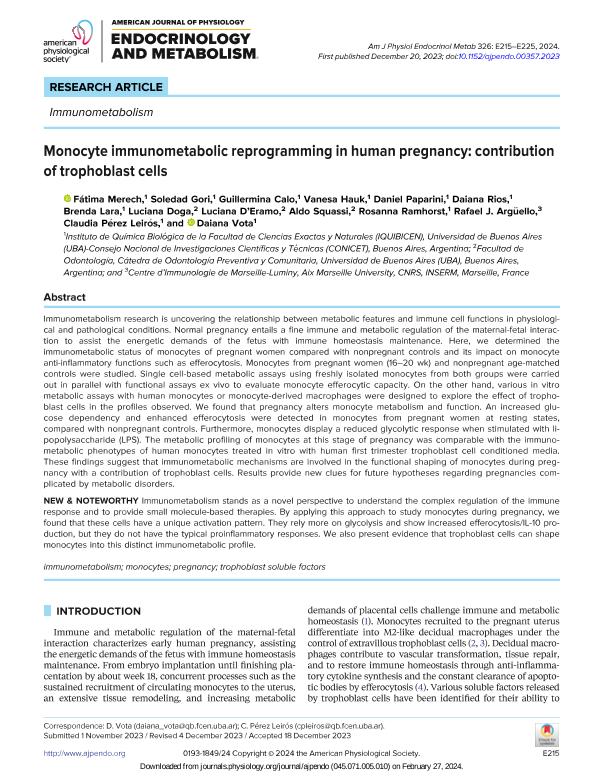Artículo
Monocyte immunometabolic reprogramming in human pregnancy: contribution of trophoblast cells
Merech, Fátima Isabel ; Gori, María Soledad
; Gori, María Soledad ; Calo, Guillermina
; Calo, Guillermina ; Hauk, Vanesa Cintia
; Hauk, Vanesa Cintia ; Paparini, Daniel Esteban
; Paparini, Daniel Esteban ; Rios, Daiana; Oliva Lara, Brenda Angélica
; Rios, Daiana; Oliva Lara, Brenda Angélica ; Doga, Luciana; D'Eramo, Luciana; Squassi, Aldo Fabian
; Doga, Luciana; D'Eramo, Luciana; Squassi, Aldo Fabian ; Ramhorst, Rossana; Argüello, Rafael José
; Ramhorst, Rossana; Argüello, Rafael José ; Perez Leiros, Claudia
; Perez Leiros, Claudia ; Vota, Daiana Marina
; Vota, Daiana Marina
 ; Gori, María Soledad
; Gori, María Soledad ; Calo, Guillermina
; Calo, Guillermina ; Hauk, Vanesa Cintia
; Hauk, Vanesa Cintia ; Paparini, Daniel Esteban
; Paparini, Daniel Esteban ; Rios, Daiana; Oliva Lara, Brenda Angélica
; Rios, Daiana; Oliva Lara, Brenda Angélica ; Doga, Luciana; D'Eramo, Luciana; Squassi, Aldo Fabian
; Doga, Luciana; D'Eramo, Luciana; Squassi, Aldo Fabian ; Ramhorst, Rossana; Argüello, Rafael José
; Ramhorst, Rossana; Argüello, Rafael José ; Perez Leiros, Claudia
; Perez Leiros, Claudia ; Vota, Daiana Marina
; Vota, Daiana Marina
Fecha de publicación:
12/2023
Editorial:
American Physiological Society
Revista:
American Journal Of Physiology-endocrinology And Metabolism
ISSN:
0193-1849
Idioma:
Inglés
Tipo de recurso:
Artículo publicado
Clasificación temática:
Resumen
Immunometabolism research is uncovering the relationship between metabolic features and immune cell functions in physiological and pathological conditions. Normal pregnancy entails a fine immune and metabolic regulation of the maternal-fetal interaction to assist the energetic demands of the fetus with immune homeostasis maintenance. Here, we determined the immunometabolic status of monocytes of pregnant women compared to non-pregnant controls and its impact on monocyte antiinflammatory functions such as efferocytosis. Monocytes from pregnant women (16-20 weeks) and non-pregnant age-matched controls were studied. Single cell-based metabolic assays using freshly isolated monocytes from both groups were carried out in parallel with functional assays ex vivo to evaluate monocyte efferocytic capacity. On the other hand, various in vitro metabolic assays with human monocytes or monocyte-derived macrophages were designed to explore the effect of trophoblast cells in the profiles observed. We found that pregnancy alters monocyte metabolism and function. An increased glucose dependency and enhanced efferocytosis were detected in monocytes from pregnant women at resting states, compared to non-pregnant controls. Furthermore, monocytes display a reduced glycolytic response when stimulated with LPS. The metabolic profiling of monocytes at this stage of pregnancy was comparable with the immunometabolic phenotypes of human monocytes treated in vitro with human first trimester trophoblast cell conditioned media. These findings suggest that immunometabolic mechanisms are involved in the functional shaping of monocytes during pregnancy with a contribution of trophoblast cells. Results provide new clues for future hypotheses regarding pregnancies complicated by metabolic disorders.
Palabras clave:
IMMUNOMETABOLISM
,
MONOCYTES
,
PREGNANCY
,
TROPHOBLAST SOLUBLE FACTORS
Archivos asociados
Licencia
Identificadores
Colecciones
Articulos(IQUIBICEN)
Articulos de INSTITUTO DE QUIMICA BIOLOGICA DE LA FACULTAD DE CS. EXACTAS Y NATURALES
Articulos de INSTITUTO DE QUIMICA BIOLOGICA DE LA FACULTAD DE CS. EXACTAS Y NATURALES
Citación
Merech, Fátima Isabel; Gori, María Soledad; Calo, Guillermina; Hauk, Vanesa Cintia; Paparini, Daniel Esteban; et al.; Monocyte immunometabolic reprogramming in human pregnancy: contribution of trophoblast cells; American Physiological Society; American Journal Of Physiology-endocrinology And Metabolism; 326; 3; 12-2023; E215-E225
Compartir
Altmétricas



